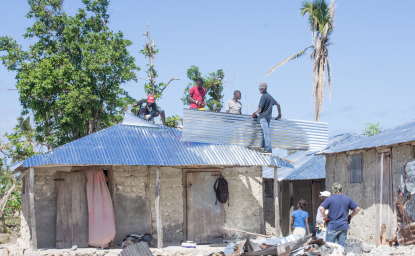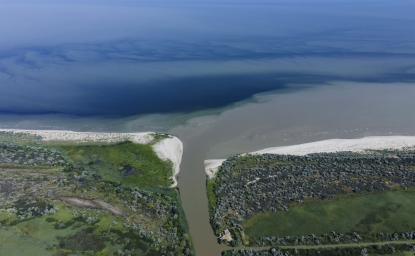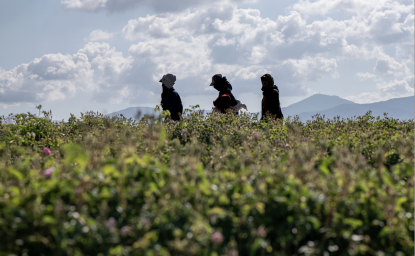Environmental Security at the 2006 International Studies Association Convention
MARCH 2006--ECSP Director Geoff Dabelko Presents Paper on Environmental Peacemaking, Chairs Panel on Resource Scarcity
MARCH 2006--ECSP Director Geoff Dabelko Presents Paper on Environmental Peacemaking, Chairs Panel on Resource Scarcity
More than 100 people attended three panels focusing on environmental security at the 47th International Studies Association convention, held March 22-25, 2006, in San Diego, California. Papers by leading authors—including Nils Petter Gleditsch, Indra de Soysa, Ken Conca, Erika Weinthal, and Richard Matthew—examined environmental issues such as water scarcity, climate change, environmental degradation, and their connections to conflict and peacebuilding. The field's strong showing at the annual international relations conference reflects the growing resurgence of interest in exploring the hidden roots of war—and alternative paths to peace.
At the panel "Environmental Peacemaking: A Stages-of-Conflict Perspective," chaired by Duke University professor Erika Weinthal, ECSP Director Geoff Dabelko outlined the types of environmental pathways to peace and confidence building. Weinthal discussed ways in which the environment can help not only to build peace after conflict, but to keep the peace. University of California-Irvine's Richard Matthew reported on the environmental and demographic roots of Nepal's current civil war, and asserted that addressing those problems might help solve the intractable conflict. University of Maryland's Ken Conca, whose new book Governing Water: Contentious Transnational Politics and Global Institution Building was awarded the coveted Alger and Sprout prizes at the convention, described his new research on the contributions of UNEP's Post-Conflict Assessment Unit to peacebuilding in war-torn countries. The thoughtful discussion following the presentation ranged from peace parks to Kyoto's Clean Development Mechanism.
Geoff Dabelko chaired the well-attended session on "Resource Scarcity and Armed Conflict," which was organized by Nils Petter Gleditsch of International Peace Research Institute, Oslo (PRIO). Representatives from PRIO, the Norwegian University of Science and Technology (NTNU), and the University of California-San Diego presented papers analyzing geographic, environmental, and population data for links between conflict and environmentally induced scarcities, including those predicted to result from climate change. These concise presentations were followed by a lively critique from University of Minnesota discussant Colin Kahl, author of the recently published book States, Scarcity, and Civil Strife in the Developing World.
In addition to these formal presentations, ECSP hosted an informal gathering of 20 ISA attendees conducting research on demography and security, with the hope of increasing the prominence of these topics at future ISA conventions and better integrating them into the field of political science. Richard Cincotta and Elizabeth Leahy of Population Action International, who presented a poster at ISA titled "A Metric Characterizing Population Age Structure and Its Relation to Armed Conflict," assisted with the planning of the event, which spurred discussion of ways to share knowledge and build on each others' work. If you are interested in joining a planned listserv dedicated to dialogue on demography and security, please contact ECSP at escp@wilsoncenter.org.
Other panels on environmental security included "Water Scarcity—Conflict and Cooperation," chaired by NTNU's Indra de Soysa, which featured new water, drought, and internal conflict research by CIESIN's Marc Levy and his colleagues. They found significant correlations between drought and conflict when utilizing global time-series analysis on subnational geo-referenced water scarcity and availability data: certain areas of the world were two to three times more likely to go to war if the previous year's rainfall was significantly below normal.
The conference program and participant list can be accessed online. Proposals for the next ISA conference, scheduled for February 28-March 3 in Chicago, Illinois, are due June 1, 2006.
To download the papers listed below, please search the online paper archive.
Resource Scarcity and Armed Conflict: Papers

The Environmental Change and Security Program (ECSP) explores the connections between environmental change, health, and population dynamics and their links to conflict, human insecurity, and foreign policy. Read more



